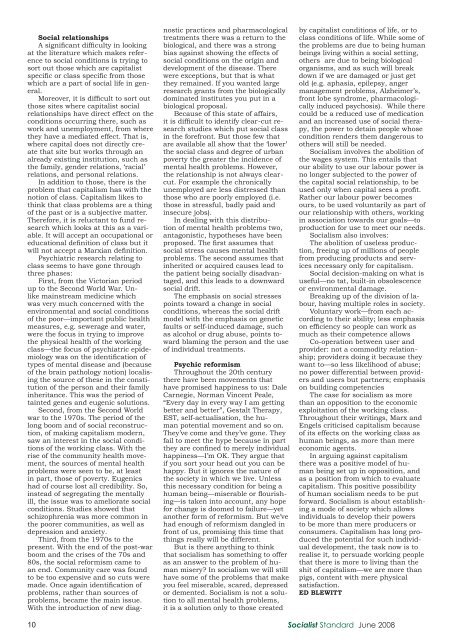Socialist Standard June 2008 - World Socialist Movement
Socialist Standard June 2008 - World Socialist Movement
Socialist Standard June 2008 - World Socialist Movement
Create successful ePaper yourself
Turn your PDF publications into a flip-book with our unique Google optimized e-Paper software.
Social relationships<br />
A significant difficulty in looking<br />
at the literature which makes reference<br />
to social conditions is trying to<br />
sort out those which are capitalist<br />
specific or class specific from those<br />
which are a part of social life in general.<br />
Moreover, it is difficult to sort out<br />
those sites where capitalist social<br />
relationships have direct effect on the<br />
conditions occurring there, such as<br />
work and unemployment, from where<br />
they have a mediated effect. That is,<br />
where capital does not directly create<br />
that site but works through an<br />
already existing institution, such as<br />
the family, gender relations, ‘racial’<br />
relations, and personal relations.<br />
In addition to those, there is the<br />
problem that capitalism has with the<br />
notion of class. Capitalism likes to<br />
think that class problems are a thing<br />
of the past or is a subjective matter.<br />
Therefore, it is reluctant to fund research<br />
which looks at this as a variable.<br />
It will accept an occupational or<br />
educational definition of class but it<br />
will not accept a Marxian definition.<br />
Psychiatric research relating to<br />
class seems to have gone through<br />
three phases:<br />
First, from the Victorian period<br />
up to the Second <strong>World</strong> War. Unlike<br />
mainstream medicine which<br />
was very much concerned with the<br />
environmental and social conditions<br />
of the poor—important public health<br />
measures, e.g. sewerage and water,<br />
were the focus in trying to improve<br />
the physical health of the working<br />
class—the focus of psychiatric epidemiology<br />
was on the identification of<br />
types of mental disease and (because<br />
of the brain pathology notion) localising<br />
the source of these in the constitution<br />
of the person and their family<br />
inheritance. This was the period of<br />
tainted genes and eugenic solutions.<br />
Second, from the Second <strong>World</strong><br />
war to the 1970s. The period of the<br />
long boom and of social reconstruction,<br />
of making capitalism modern,<br />
saw an interest in the social conditions<br />
of the working class. With the<br />
rise of the community health movement,<br />
the sources of mental health<br />
problems were seen to be, at least<br />
in part, those of poverty. Eugenics<br />
had of course lost all credibility. So,<br />
instead of segregating the mentally<br />
ill, the issue was to ameliorate social<br />
conditions. Studies showed that<br />
schizophrenia was more common in<br />
the poorer communities, as well as<br />
depression and anxiety.<br />
Third, from the 1970s to the<br />
present. With the end of the post-war<br />
boom and the crises of the 70s and<br />
80s, the social reformism came to<br />
an end. Community care was found<br />
to be too expensive and so cuts were<br />
made. Once again identification of<br />
problems, rather than sources of<br />
problems, became the main issue.<br />
With the introduction of new diagnostic<br />
practices and pharmacological<br />
treatments there was a return to the<br />
biological, and there was a strong<br />
bias against showing the effects of<br />
social conditions on the origin and<br />
development of the disease. There<br />
were exceptions, but that is what<br />
they remained. If you wanted large<br />
research grants from the biologically<br />
dominated institutes you put in a<br />
biological proposal.<br />
Because of this state of affairs,<br />
it is difficult to identify clear-cut research<br />
studies which put social class<br />
in the forefront. But those few that<br />
are available all show that the ‘lower’<br />
the social class and degree of urban<br />
poverty the greater the incidence of<br />
mental health problems. However,<br />
the relationship is not always clearcut.<br />
For example the chronically<br />
unemployed are less distressed than<br />
those who are poorly employed (i.e.<br />
those in stressful, badly paid and<br />
insecure jobs).<br />
In dealing with this distribution<br />
of mental health problems two,<br />
antagonistic, hypotheses have been<br />
proposed. The first assumes that<br />
social stress causes mental health<br />
problems. The second assumes that<br />
inherited or acquired causes lead to<br />
the patient being socially disadvantaged,<br />
and this leads to a downward<br />
social drift.<br />
The emphasis on social stresses<br />
points toward a change in social<br />
conditions, whereas the social drift<br />
model with the emphasis on genetic<br />
faults or self-induced damage, such<br />
as alcohol or drug abuse, points toward<br />
blaming the person and the use<br />
of individual treatments.<br />
Psychic reformism<br />
Throughout the 20th century<br />
there have been movements that<br />
have promised happiness to us: Dale<br />
Carnegie, Norman Vincent Peale,<br />
“Every day in every way I am getting<br />
better and better”, Gestalt Therapy,<br />
EST, self-actualisation, the human<br />
potential movement and so on.<br />
They’ve come and they’ve gone. They<br />
fail to meet the hype because in part<br />
they are confined to merely individual<br />
happiness—I’m OK. They argue that<br />
if you sort your head out you can be<br />
happy. But it ignores the nature of<br />
the society in which we live. Unless<br />
this necessary condition for being a<br />
human being—miserable or flourishing—is<br />
taken into account, any hope<br />
for change is doomed to failure—yet<br />
another form of reformism. But we’ve<br />
had enough of reformism dangled in<br />
front of us, promising this time that<br />
things really will be different.<br />
But is there anything to think<br />
that socialism has something to offer<br />
as an answer to the problem of human<br />
misery In socialism we will still<br />
have some of the problems that make<br />
you feel miserable, scared, depressed<br />
or demented. Socialism is not a solution<br />
to all mental health problems,<br />
it is a solution only to those created<br />
by capitalist conditions of life, or to<br />
class conditions of life. While some of<br />
the problems are due to being human<br />
beings living within a social setting,<br />
others are due to being biological<br />
organisms, and as such will break<br />
down if we are damaged or just get<br />
old (e.g. aphasia, epilepsy, anger<br />
management problems, Alzheimer’s,<br />
front lobe syndrome, pharmacologically<br />
induced psychosis). While there<br />
could be a reduced use of medication<br />
and an increased use of social therapy,<br />
the power to detain people whose<br />
condition renders them dangerous to<br />
others will still be needed.<br />
Socialism involves the abolition of<br />
the wages system. This entails that<br />
our ability to use our labour power is<br />
no longer subjected to the power of<br />
the capital social relationship, to be<br />
used only when capital sees a profit.<br />
Rather our labour power becomes<br />
ours, to be used voluntarily as part of<br />
our relationship with others, working<br />
in association towards our goals—to<br />
production for use to meet our needs.<br />
Socialism also involves:<br />
The abolition of useless production,<br />
freeing up of millions of people<br />
from producing products and services<br />
necessary only for capitalism.<br />
Social decision-making on what is<br />
useful—no tat, built-in obsolescence<br />
or environmental damage.<br />
Breaking up of the division of labour,<br />
having multiple roles in society.<br />
Voluntary work—from each according<br />
to their ability; less emphasis<br />
on efficiency so people can work as<br />
much as their competence allows<br />
Co-operation between user and<br />
provider: not a commodity relationship;<br />
providers doing it because they<br />
want to—so less likelihood of abuse;<br />
no power differential between providers<br />
and users but partners; emphasis<br />
on building competencies<br />
The case for socialism as more<br />
than an opposition to the economic<br />
exploitation of the working class.<br />
Throughout their writings, Marx and<br />
Engels criticised capitalism because<br />
of its effects on the working class as<br />
human beings, as more than mere<br />
economic agents.<br />
In arguing against capitalism<br />
there was a positive model of human<br />
being set up in opposition, and<br />
as a position from which to evaluate<br />
capitalism. This positive possibility<br />
of human socialism needs to be put<br />
forward. Socialism is about establishing<br />
a mode of society which allows<br />
individuals to develop their powers<br />
to be more than mere producers or<br />
consumers. Capitalism has long produced<br />
the potential for such individual<br />
development, the task now is to<br />
realise it, to persuade working people<br />
that there is more to living than the<br />
shit of capitalism—we are more than<br />
pigs, content with mere physical<br />
satisfaction.<br />
ED BLEWITT<br />
10 <strong>Socialist</strong> <strong>Standard</strong> <strong>June</strong> <strong>2008</strong><br />
<strong>June</strong> 08.indd 10 20/5/08 10:39:42






